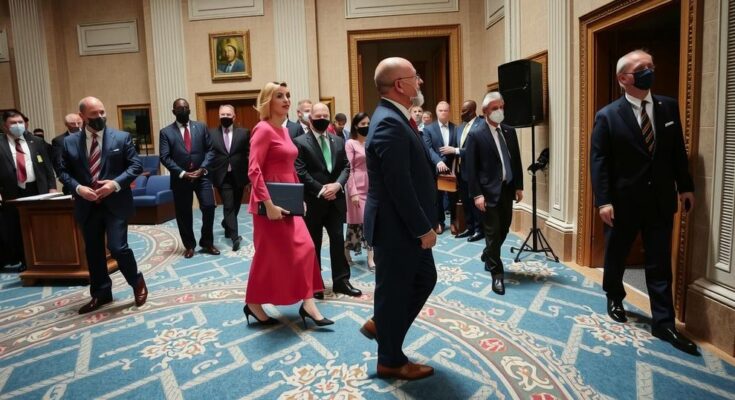Four years after the January 6 insurrection, 157 election deniers remain in Congress, revealing the trivialization of the ‘election denier’ label. This includes 137 in the House and 20 in the Senate, with political consequences nearly nonexistent. Comparisons with swift accountability measures in South Korea and Brazil underscore the failures in the U.S. to hold leaders accountable for instigating the riot, breeding a culture of impunity and normalization of misinformation about elections.
Four years following the January 6 insurrection, the political landscape within the United States Congress remains unchanged, with a substantial number of election deniers persisting in their roles. Currently, there are 157 members within the 119th Congress who have either cast doubt on or actively challenged the legitimacy of the 2020 presidential election results. This figure, though slightly reduced from 172 in the previous Congress, highlights that the label of ‘election denier’ has lost its political weight, becoming trivialized in American political discourse.
Among these election deniers, there are 137 in the House of Representatives and 20 in the Senate, accounting for more than 38% of the Republican caucus in the Senate and over 62% in the House. Notable figures include Senators Ted Cruz and Rick Scott, alongside the entirety of the Republican House leadership. Alarmingly, this trend extends beyond Congress, with 10 of 27 Republican governors identified as election deniers, as well as various attorneys general and secretaries of state. This landscape indicates that repercussions for promoting misinformation regarding the election remain minimal.
Comparatively, the political consequences faced by election deniers in other countries, like South Korea and Brazil, have been significantly different. In South Korea, President Yoon Suk Yeol faced impeachment following a controversial martial law declaration. In Brazil, a swift and decisive reaction to the January 8 riots led to the arrest of key figures tied to the unrest following Jair Bolsonaro’s defeat. These examples emphasize the notion that accountability and consequences can manifest rapidly in other democracies.
In contrast, attempts to hold former President Trump and his allies accountable for the events surrounding January 6 have proceeded slowly in the United States. While there have been over 900 convictions related to the riots, the Justice Department’s approach has been criticized for being overly cautious, focusing initially on individual participants rather than addressing broader issues within Trump’s inner circle. This deliberate process, intended to maintain a nonpartisan stance, may have inadvertently contributed to the normalization of election denial in American politics, with the lack of timely accountability breeding a culture of impunity.
At the crux of this issue is the realization that politics cannot be divorced from political consequences. The delayed and hesitant responses from key figures, including Attorney General Merrick Garland, have inadvertently legitimized the presence of election deniers in Congress. As a result, 157 election deniers remain in Congress, indicative of a troubling normalization of behavior that should incur serious political and legal ramifications.
The article discusses the persistence of election deniers within the United States Congress, specifically focusing on the ramifications of the January 6, 2021 insurrection and the attempts to challenge the legitimacy of the 2020 presidential election. It contrasts the American political scene with responses observed in other democracies, such as South Korea and Brazil, highlighting the urgent actions taken against those who sought to undermine democracy. The commentary emphasizes the failure of American political institutions to impose necessary consequences on individuals who continue to propagate misinformation regarding election legitimacy, particularly prominent figures within the Republican Party.
In summary, the enduring presence of 157 election deniers in Congress demonstrates a profound shift in the political landscape where such claims have become normalized. The contrasting swift responses seen in South Korea and Brazil highlight a disparity in accountability measures in the United States. The approach of emphasizing nonpartisanship in addressing the accountability of those involved in the January 6 events has resulted in a lack of political urgency and has allowed the culture of election denial to thrive unchecked within American politics.
Original Source: zeteo.com




